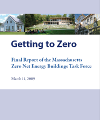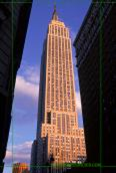The Green Building Roundtable meets on a quarterly basis to discuss the current and emerging trends in green building technologies and sustainable building and site design. Experts and interested individuals in the field meet and participate in these interactive discussions which also include tours and presentations. Below is an archive of previous Green Building Roundtable topics and associated resources:
-
October 17, 2008
 This session discussed the pros and cons of various LID techniques and how these methods can save money and promote better storm water management on-site. After discussing LID and the MA DEP’s new State Stormwater management Standards participants spoke with the design engineer and owner and operator of One Jackson Place who recently installed biofiltration landscape islands at their facility in Devens. Participants were able to view the functioning LID techniques first-hand and discuss design, construction, operation and maintenance issues and the pros and cons of LID. Participants left with a better understanding of where LID approaches can be implemented and how they can save on upfront materials costs as well as long term-maintenance. The following are links to some of the resources that were made available to attendees:
This session discussed the pros and cons of various LID techniques and how these methods can save money and promote better storm water management on-site. After discussing LID and the MA DEP’s new State Stormwater management Standards participants spoke with the design engineer and owner and operator of One Jackson Place who recently installed biofiltration landscape islands at their facility in Devens. Participants were able to view the functioning LID techniques first-hand and discuss design, construction, operation and maintenance issues and the pros and cons of LID. Participants left with a better understanding of where LID approaches can be implemented and how they can save on upfront materials costs as well as long term-maintenance. The following are links to some of the resources that were made available to attendees:
LID Handouts
Chicago Green Alley Handbook
Littleton LID BMP Manual
EPA Study on LID Costs
Stormtech Subsurface Stormwater Management
UNH Stormwater Center
-
August 31, 2009
 Passive Energy Building Design and Construction—September 2009
Passive Energy Building Design and Construction—September 2009
As a spin off from our April Green Building Roundtable on Getting to Zero Energy Building, this Roundtable focused on Passive Energy Design which is quickly growing in popularity again as energy costs remain unstable and nations, cities, towns and individuals strive to reduce their carbon footprint to combat global climate change. Participants from both the residential and commercial/industrial sector discussed the latest in energy efficient building techniques and Passive House Design standards. We also viewed a short film on a Passive and Active solar mixed use development in Germany which utilizes a number of Passive House standards. Many resources and funding programs were shared and discussed at this session. Below are links to those resources:
-
March 31, 2009

Getting to Zero Energy Building -- April 2009
In this session we discussed some of the latest advancements in energy efficient building design. Participants shared their experiences with implementing cost-effective solutions to constructing and renovating buildings to maximize 
energy efficiency. Carter Scott from Transformations, Inc. gave a great overview of how he is building Zero-net energy homes today. We went over proposed changes to the MA building code, as well as a look at the final report from the Governor's Zero-Net Energy Building Task Force—two steps Massachusetts is taking to help lead the path towards zero-energy building and the goal of meeting our carbon reduction targets by 2030. We also touched on passive survivability and plus-energy buildings that are essentially becoming decentralized power suppliers.
The following are links to the presentations and some of the resources that were made available to attendees:
-
December 31, 2009
 Construction and Deep Energy Retrofits -- January 2010
Construction and Deep Energy Retrofits -- January 2010
As interest in energy efficient design and construction remained a key topic for this roundtable group, this quarter’s roundtable focused on foundation construction methods to control moisture. In the second half of the session, we discussed super-insulation and other deep-energy retro-fits and some of the opportunities and challenges in implementing these methods into new construction and existing buildings. We finished off with a quick look at the deep energy retrofits of the Empire State Building and provided some valuable resources for attendees.
Construction and Deep Energy Retrofit Presentations